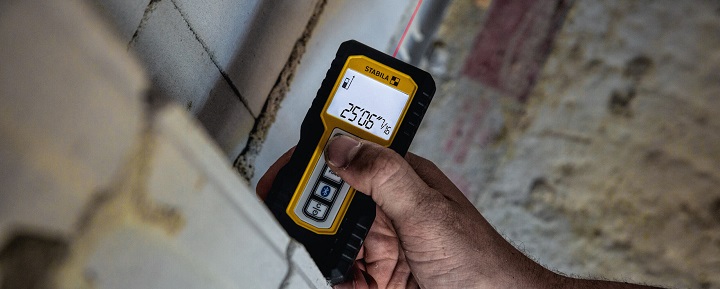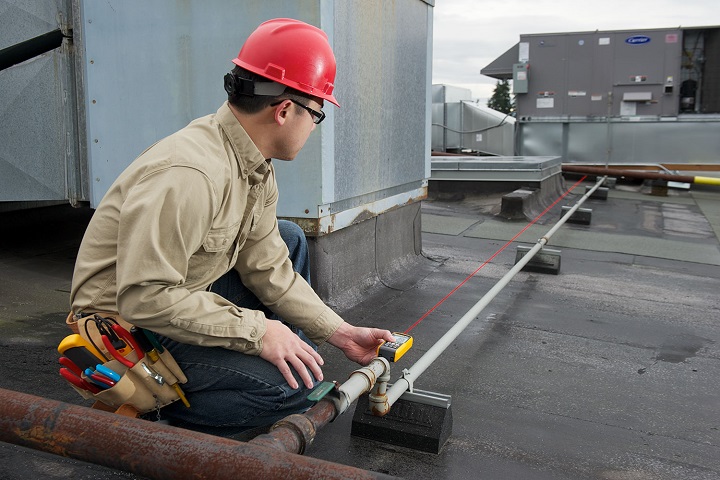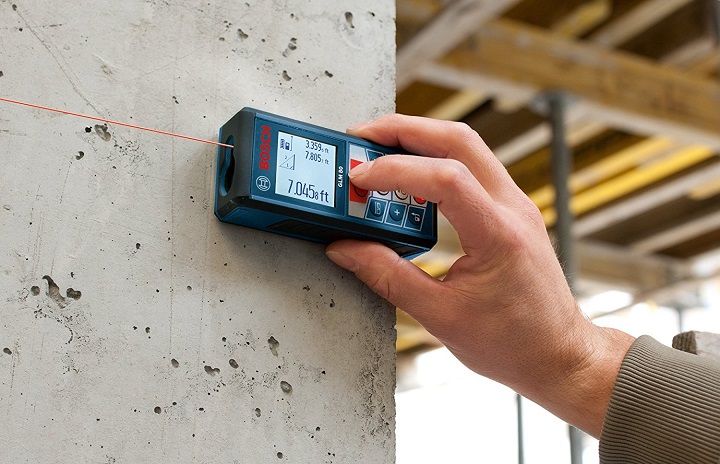Whether it is for demanding construction work or for simple home renovation projects, having the correct measurements is essential to get the job done right. You’ve probably used a tape measurer. It’s pretty straightforward, right? You just extend it, place the beginning part of the tape on one end and look at the measurement on the other.
However, tape measurers can actually turn out to be a bit more complicated when you need to take long measurements – there is no stable pint to hook the tape measurer to, and you need the help of an extra person to hold it for you so the tape stays in place and you can actually take a measurement. And there is the issue with obstacles. A tape measurer is unusable if there are obstacles, like posts or furniture, blocking the path from the starting point to the end of the measurement. Laser distance measures can make measuring more convenient and reliable in these situations.
How Does a Laser Distance Measure Work?

A laser distance meter is an innovation to the old tape measurer. It includes all the basic functions of traditional measuring and it eliminates some of the tape measurer’s limitations. It also includes some features that make measuring a lot easier.
A laser distance meter measures a distance between two points. For that, it uses a pulse light to a target and then calculates the distance by the length of time the reflection takes to return. Because it uses light, it removes the limitations of the physical tape of the traditional measurers, giving you many advantages. Some of them include being able to measure long distances without the help of a second person, measuring ceilings or other high places without ladders, measure through tight spaces, etc.
How Accurate Are Laser Distance Measurements?

Laser measurement accuracy is extremely high these days. The modern laser distance measurers have functions that make complex calculations of area, volume and triangulation extremely easy to perform and help reduce human error on-site. For more complex calculations, the device will either take care of it on board or in some cases, extended software is available.
Proper use of the device plays a vital role in the accuracy of the measurement. Although laser measurer devices are incredibly fast and efficient, there are situations that will challenge any make or model. Basically, the secret to taking successful measurements with any laser distance measurer device lies in aiming at a solid target. Measuring highly reflective, translucent, porous, water covered or bright sunlight cover surfaces will be difficult. This is true for all laser distance measurers and is not a defect issue but simply the nature of the product.
As with any new technology, start slow and work your way into more advanced measurements. Once you get comfortable with how the device operates, you will start trusting the results.
How to Choose the Right Laser Meter for You

With the wide range of laser meters from different brands on the market, it’s clear that some key features make a difference. You may not need all the technology and features available for laser meters, so here is what you need to consider to find out which ones are right for you.
Before you go shopping, ask yourself these questions: How far do you typically need to measure? Do you work mostly indoors or outdoors? Do you focus on residential or commercial projects?
If you work mostly on residential sites, 15 metres of the range should cover indoor measurements. For outdoor jobs, you may want to go with a tool capable to measure greater distances. Commercial applications generally require larger distance measurements, so a longer range tool may make more sense.
You’ll also need to decide how much accuracy do you need. Most laser distance meters will have either 1.5mm or 3mm accuracy at 10 metres. For basic estimates, the 3 mm accuracy works just fine. Even if you don’t need as much as 1.5 mm accuracy, longer-range models will typically provide it.
Last but not least, how much memory or storage do you need? Note that a basic laser distance meter won’t have any memory storage. The best it will allow you is to hold a measurement. High-end models might have storage for up to 200 measurements or more. So, decide how comfortable you are recording measurements in a notebook or on your phone.
If you are fine with taking notes or you don’t trust technology that much, memory may not be an important feature for you. But keep in mind that being able to store those measurements right in the device will make this task a lot faster and easier.